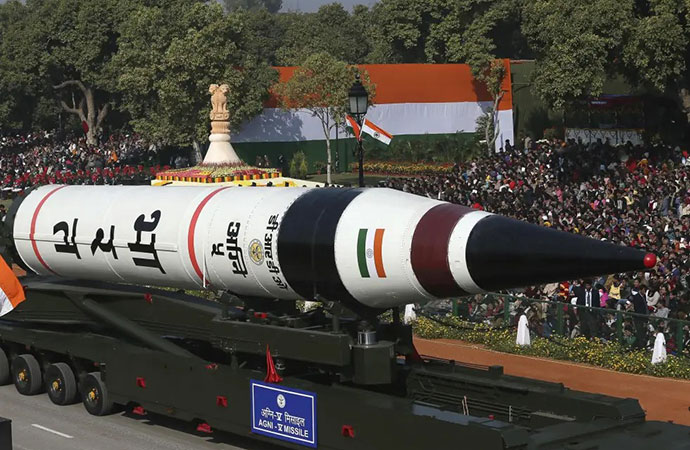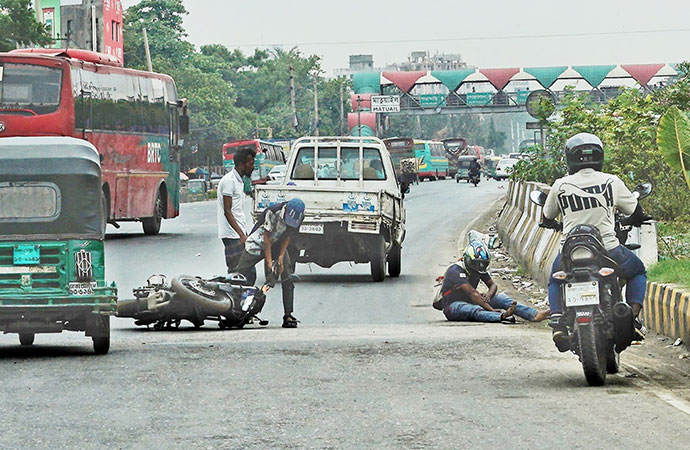Column


Photo: AP/UNB
The ceasefire between India and Pakistan along Kashmir's Line of Control (LoC) has become precarious after the recent Pahalgam terrorist attack. India has long accused Pakistan of supporting a proxy insurgency in Kashmir to destabilize India. The killing of 26 tourists in the picturesque Pir Panjal Valley was the worst terror attack in recent years. An official statement from the Indian foreign secretary referred to "cross-border linkages of the terrorist attack". Pakistan has requested evidence and a neutral international probe. China, Russia and the United States have called for restraint and dialogue.
The Indian response has included downgrading diplomatic ties and reducing staff at the Pakistan High Commission in New Delhi. In an unprecedented move, India declared that it would hold the longstanding Indus Water Treaty to be in "abeyance" after the Pahalgam attack. The treaty has survived for more than 65 years through numerous wars and conflicts, including the 1971 Bangladesh Liberation War. India has also closed the Attari-Wagah border crossing and cancelled SAARC visas for Pakistanis.
India's premier Narendra Modi has vowed to pursue the perpetrators of the Pahalgam attack to the ends of the Earth. Pakistan's premier Shehbaz Sharif stressed that any abrogation of the Indus Treaty would be regarded as an "act of war". While official evidence from the Indian government linking Pakistan to the Pahalgam attack has not been forthcoming, the Indian pro-government media was quick to jump the gun to point fingers at Pakistan amid noisy television debates.
Most analysts believe some form of Indian retribution is likely. Gunfire has erupted along the LoC since the attack in Pahalgam. Reports indicate that the Indian Navy is regrouping in the Arabian Sea near the coastline of Sindh and Balochistan. In 2019, the Indian Air Force conducted air strikes at Balakot in Khyber Pakhtunkhwa which resulted in Pakistan shooting down one Indian aircraft and repatriating an Indian pilot who parachuted into Pakistani territory.
Both India and Pakistan are nuclear powers with sizeable nuclear arsenals ranging from 170 to 200 warheads. The risk of a conflagration escalating into full-scale nuclear war is real and dangerous. Scientists have predicted a global nuclear winter in the event of a worst-case scenario in which India and Pakistan destroy major cities in the subcontinent with their nuclear weapons. A smaller nuclear war may see the use of tactical nuclear weapons on the battlefield. India's arsenal includes a sea-based deterrent carried by Indian nuclear submarines. Pakistan's arsenal features tactical nuclear weapons.
Heavy weaponry has reportedly been deployed along the LoC in Kashmir. Sorties by Pakistan Air Force aircraft along the India-Pakistan border have also been reported. The entire international border stretching from Sindh and Rajasthan in the south to Punjab in the north is on edge amid tensions. Some reports have also indicated Indian naval activity near Bangladesh's maritime territory in the Bay of Bengal. Retired Indian military officers have criticized the Modi government for redeploying troops stationed in Kashmir to the border with Bangladesh. According to Major General (retd.) G. D. Bakshi, the redeployment of troops away from the Pir Panjal range resulted in the vulnerability of Pahalgam.
Bangladesh's foreign ministry released a statement which said that Dhaka "strongly condemns the terror attack in Jammu and Kashmir in India resulting in the tragic loss of innocent lines". The statement underscored Bangladesh's "unwavering commitment to the global fight against terrorism". Foreign Adviser Touhid Hossain remarked that "Bangladesh at this stage does not want to mediate. But Bangladesh may consider it if they want. We have good relations with both countries".
The United Arab Emirates brokered the ceasefire along the LoC in 2021. Several countries have been floated as potential third-party mediators, including the United States, Russia, Bangladesh and Arab states on the Persian Gulf. Bangladesh has a long history of providing a platform for India and Pakistan to engage, including through the founding of SAARC and hosting the trilateral summit in Dhaka in 1998.
The risk of climbing the escalatory ladder puts the entire region in jeopardy. The standoff between India and Pakistan is essentially a proxy war due to Pakistan's support for Kashmiri rebels who want an end to Indian rule in the former princely state. The International Convention for the Suppression of the Financing of Terrorism (ICSFT) embeds a set of values and norms to discourage proxy war.
India's threat to suspend the Indus Water Treaty sets a dangerous precedent. The treaty promotes information exchange and sharing of data on water flow in the Indus. As the upper riparian state, India is obliged under customary international law to share data with the downstream and lower riparian state Pakistan. According to Shiraz Menon, who was Pakistan's additional commissioner for the Indus Water Treaty, "India was sharing only around 40% of the data even before it made the latest announcement". The weaponization of water in a transboundary river will add to the woes of climate change which has caused increased flooding along the Indus Basin in recent years.
The Indus Treaty has been regarded by the World Bank as "profoundly important and successful". Conceived by the American lawyer and Tennessee Valley Authority administrator David E. Lilienthal, the treaty was designed to be permanent and survived the 1965 and 1971 wars. The treaty was signed by Pakistani President Ayub Khan and Indian Prime Minister Jawaharlal Nehru in Karachi in 1960. The treaty includes a three-tier dispute resolution mechanism involving the Permanent Indus Commission, a neutral expert and an arbitral tribunal. The Modi government has withdrawn from the dispute resolution mechanism by withholding appointments to the Permanent Indus Commission. India has called for a substantial renegotiation and revision of the Indus Water Treaty.
According to the foreign policy scholar Janice Gross Stein, the resolution of proxy war involves multiple dimensions, including direct negotiations, management of indirect conflict and competitive hierarchies, and conditions on the ground. For superpowers, great powers and regional powers, confidence building measures can influence complex relationships. Stein has referred to the use of the US-Soviet hotline during the 1973 Israel-Egypt War. A hotline was also set up between India and Pakistan but has been disavowed by the Modi government. There are no reports of backchannel diplomacy.
In her article titled "Proxy Wars - How Superpowers End Them. The Diplomacy of War Termination in the Middle East" published in International Journal in 1980, Stein also noted that "only when military disaster seemed imminent did a patron put at risk the superpower relationship to protect a client".
The motivation of superpowers to pursue peace and end proxy war is motivated by the prospect of damage to their own interests. Stein states that "when the superpowers bargain to end a war between their clients, they frequently pursue a shared goal of overriding importance and recognize that common constraints operate for both. Both are struggling to avoid the direct confrontation which might grow out of the escalation of a regional war, and in their struggle they are partners as well as adversaries. Co-operation is the response to these mutually acknowledged constraints, and this co-operation, which grows out of a desire to avoid mutual loss rather than to achieve joint gain, is related to a number of central issues in the relationship between the superpowers".
What is off the negotiating table is often more important than what is on the negotiating table. The ground realities of their proxies dictate the negotiations between patron states. Proxy war in South Asia has caused immeasurable suffering over the years. The destabilization of the subcontinent via proxy war must be brought to an end.
Umran Chowdhury is Assistant Editor of the Dhaka Courier and Research Associate at the Cosmos Foundation and Bay of Bengal Institute.

























Leave a Comment
Recent Posts
Pedaling Through the Mangroves ...
The journey from the bustling streets of Barishal to the serene, emera ...
Why the Interim Government mus ...
Two weeks out from what is expected to be a red letter day in the figh ...
Doesn’t matter who thinks what about Bangladesh deci ..
The Other Lenin
US President Donald Trump said his administration
Govt moves to merge BIDA, BEZA, BEPZA, MIDA